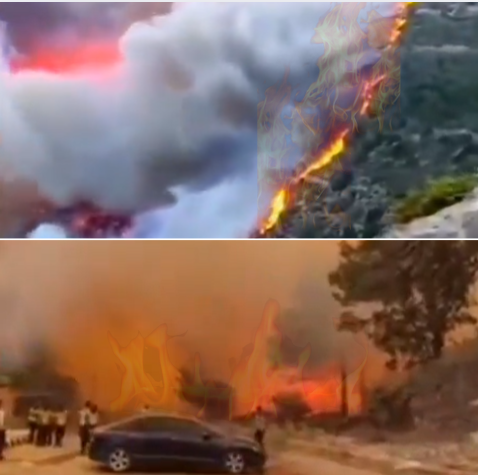Since 30 June 2025, wildfires have swept through over 10,000 hectares in Syria’s Latakia countryside, affecting 28 areas and forcing the evacuation of more than 1,120 residents.
Over 120 civil defence teams—including firefighters from Turkey, Jordan, and Lebanon—have battled the flames for more than a week, contending with hazardous winds, extreme heat, and unexploded ordnance.
Despite the widespread destruction of forests, farmland, and homes, no civilian fatalities have been reported as emergency operations continue and international support grows.
Thousands Displaced, Livelihoods Destroyed
The wildfires, which officials have labelled “catastrophic” and “an environmental calamity,” have obliterated roughly 100 square kilometres of woodland—over 3% of Syria’s total forest cover. Villages such as Qastal Maaf, Al-Rihaniyah, Shalaf, Kassab, and Ras al-Ayn have suffered the most, with entire olive groves, livestock, and critical infrastructure lost to the flames.
The Al-Basit power station was severely damaged, causing prolonged electricity outages and water shortages in the region. According to Raed al-Saleh, Syria’s Minister of Emergency and Disaster Management, “We grieve for every tree and home lost.
The swift evacuation and coordinated response have thankfully spared lives, but the impact on livelihoods and the environment is immense.” Civil defence director Abdul Kafi Kayyal described the dangerous conditions faced by responders: “Our teams are working around the clock, navigating landmines and treacherous mountain roads to protect lives and property.”
Climate, Conflict, and International Aid
The fires erupted amid a backdrop of severe drought, soaring summer temperatures, and relentless winds—conditions that scientists and local officials attribute to the escalating climate crisis. Years of below-average rainfall and rising temperatures have left the region’s forests tinder-dry and highly flammable.
The situation is further complicated by the presence of unexploded ordnance from Syria’s prolonged conflict, which has made firefighting operations perilous and forced teams to avoid certain areas. International support has been swift, with Lebanon, Turkey, and Jordan providing aerial firefighting assistance and equipment.
The United Nations has deployed emergency teams to assess humanitarian needs, and several NGOs are coordinating relief for displaced families. Local authorities warn that while the main blazes are being contained, smaller fires and smouldering hotspots continue to threaten communities, and full recovery will take months, if not years.
Rebuilding and Resilience
As the immediate threat begins to subside, attention is turning to recovery and rebuilding. Hundreds of families remain in temporary shelters, and many are facing the loss of homes, crops, and livestock—their primary sources of income. Environmental experts warn of long-term consequences, including soil erosion, loss of biodiversity, and the risk of future landslides.
Humanitarian agencies are calling for urgent international assistance to restore basic services and support reforestation efforts. “This is not just an environmental disaster, but a humanitarian one,” said a spokesperson for the UN Office for the Coordination of Humanitarian Affairs (OCHA). “We need sustained support to help these communities rebuild their lives and restore the natural landscape.”
The Logical Indian’s Perspective
The devastation in Latakia is a powerful reminder of the complex challenges posed by climate change, conflict, and humanitarian crises. The courage and solidarity shown by local and international responders are inspiring, but the tragedy also highlights the urgent need for global cooperation, climate action, and peacebuilding.
As we stand with the people of Latakia, we must reflect on our collective responsibility to protect both vulnerable communities and the environment. How can we, as a global community, strengthen disaster preparedness, support conflict resolution, and invest in sustainable solutions to prevent such tragedies in the future?
Devastating wildfires rage across Syria's Latakia region for a 3rd day
— Nabila Jamal (@nabilajamal_) July 7, 2025
Over 20 towns evacuated, 10,000 hectares reduced to ash
Syria & Jordan launch joint firefighting ops with choppers & emergency crews battling the flames#Syria #Latakia #wildfire pic.twitter.com/H1gyQliCyd












